Browse Exhibits (9 total)
Eastern Wisdom and Modern Life
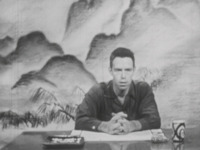
13 episodes, 1959, KQED (San Francisco)
From WNET:
"This series of programs deals with the themes of Eastern philosophy and their application to modern life. The programs are illustrated by Chinese and Japanese paintings and other Asian objects of art. Photographs and physical demonstrations of various principles and processes are also incorporated in the presentation. Host Alan Watts uses Chinese ink and rush for drawings and diagrams he executes during the series."
Basic issues of man
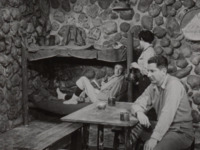
12 episodes, 1960-1963, WGTV (Atlanta)
From WNET:
"The series introduces the basic liberal arts studies and the basic issues with which they deal. The basic issues with which man deals are real, and the humanistic studies impinge on modern man’s own actions and attitudes. Each film will point out the historical humanistic literature which deals with the modern problem. This series identifies and illuminates certain basic issues which face all men – persistent problems which each man in every age must try to solve. Each program first poses a basic question and then presents some of the enduring … on that question. Although the series draws no conclusions, the programs deal with each of the following six areas: the nature of man, man and society, the political life of man, creativity and the arts, the scientific life of man, and the philosophical life of man. Several of the programs make extensive use of very imaginative and symbolic settings; several are half-hour plays."
The essentials of freedom
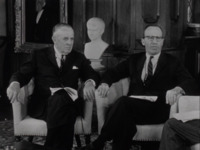
6 episodes, 1958, WOSU-TV (Columbus, OH)
From WNET:
"This series is based on a conference held at Kenyon College, Gambler, Ohio, last April; the full title of the conference was “The Essentials of Freedom: The Idea and Practice of Ordered Liberty in the Twentieth Century.” The college described the conference thusly: “The intention behind the conference was to help people to remember the underlying essentials of the free life; this intention could be achieved only by penetrating beyond the surface and the catchwords of our daily life to the spiritual principles and historical ideas which made Western, Christian civilization free as no previous or parallel culture has been free. The conference was thus not concerned with the eccentric but the central, not with the abnormal but the normal, not with the chaotic but with the organized and purposive concept of freedom.” The series was produced by WOSU-TV, Columbus, in cooperation with the Ohio State University department of photography. The producer was David H. Ayers, and the director was Robert Wagner."
Meant for reading
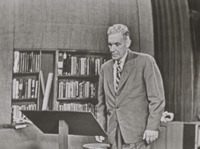
10 episodes, 1959, KQED (San Francisco)
From WNET:
"This ten-program series is a spoken anthology of great literature chosen and read by John W. Dodds, professor of English and director of special programs in humanities at Stanford University. The programs are divided into six categories: freedom, mortality, nature, stories in verse, satire and love. The readings are from authors as varied as Socrates, Shakespeare, Donne, Benchley, Whitman, Milton, Benet and Emily Dickinson. Each program blends philosophy and literature around a central theme. The series was produced for KQED, San Francisco."
The measure of man
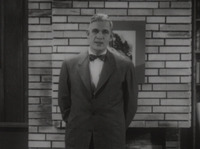
6 episodes, 1957, KQED (San Francisco)
From WNET:
"Dr. John W. Dodds, Professor of English and a distinguished author, takes careful aim and levels a barrage of studious inquiry at the human race, its ideas, ideals, and idols. He looks into such matters as loyalty, dignity, and the sense of tragedy. Qualified though he is to philosophize on the frailties and merit of humanity, as a scholar, he still turns often and intelligently to the writings of others. With his vast knowledge of literature, acquired through more than thirty years as a teacher of English, he is able to find selections from classical and current writings that succinctly draw together the clearest thinking on the varied aspects of taking a “measure of man.” Dr. Dodds – a master of dramatic reading – reads many literary selections aloud. His reading range from the facetious humor of Thurber to the powerful drama of Euripides. It is his hope that through these readings and discussions, he will lead the viewer into further debate, introspection, and reading on the subjects which measure man. The series was produced for the Center by KQED, San Francisco. The producer was EG Valens; assistant producer, Herbert D. Seiter; set designer, Tom Borden; and camera work by Joe Dieves. “The Measure of Man” was filmed at WA Palmer Films, Inc."
Conversations with Eric Hoffer
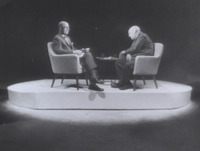
6 episodes, 1963, KQED (San Francisco)
From WNET:
"Eric Hoffer, philosopher and longshoreman, is interviewed in six stimulating half-hour programs by James Day, general manager of KQED in San Francisco. The conversations are based on Mr. Hoffer’s latest book, “The Ordeal of Change,” published in March of 1963 by Harper and Row."
Great Ideas
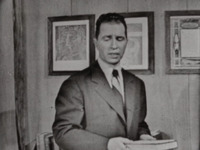
52 episodes, 1956-1957, KGO-TV (San Francisco)
From WNET:
"'The Great Ideas' is a series devoted to discussions on the “basic ideas fundamental to man’s everyday life.” There are programs on government, philosophy, law and labor. Adler, noted philosopher and teacher, discusses these problems in an informal, nontechnical style. He makes extensive use of visual materials and a blackboard to illustrate his points. At the conclusion of each program Adler answers questions sent in by the audience. Originally broadcast over KGO-TV, San Francisco, the series drew a heavy listener response. Appearing with Adler on the series is Dean Lloyd Luckman, coordinator of studies at San Francisco City College. In the final thirteen programs, Dr. Adler discusses punishment, justice, language, democracy, progress, beauty, war and peace, change, emotion, truth, freedom, good and evil, and God."
People
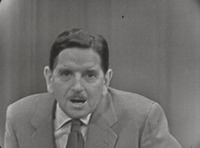
13 episodes, 1955, Hofstra College
From WNET:
"Drs. Chappell and Goldberg, Hofstra College, demonstrate why we think, feel and act as we do. Live demonstrations and experiments are used with student and home audience participation. Limitations of sense organs in perception are stressed. The overall objectives are as follows: to de-emotionalize the viewer, to substitute understanding for emotional beliefs, and to increase the viewer’s capacity for adjusting. This series was produced by Hofstra College, Hempstead, NY."
The intent of art
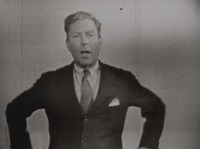
7 episodes, 1959, WGBH (Boston)
From WNET:
"This series explores some of the purposes which underlie works of art, with reference to their meaning for the average person in today’s world. Drawing principally on the collection of the Museum of Fine Arts in Boston, Bartlett H. Hayes Jr. discusses such topics as art as utility, social order and natural knowledge, and considers such questions as “Is it really true that modern art doesn’t communicate as clearly as art of the past?” The programs originated live from the galleries of the Museum of Fine Arts."

